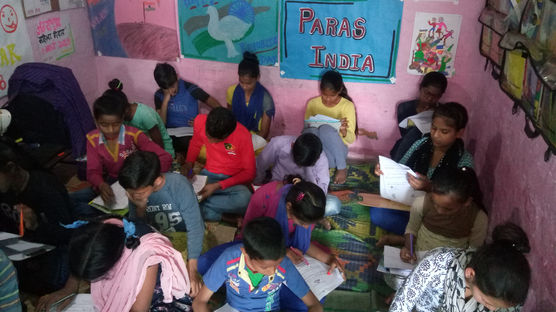

INTRODUCTION
Education transforms lives and is at the heart of PARAS India‘s mission to work towards EMPOWERMENT. PARAS India believes “education is a human right for all, a powerful driver of development and is the most important factor to ensure ‘Equality of Opportunities’ by promoting employment, gender equality, and poverty reduction and thus fostering social cohesion”.
The poor and rural communities have not received benefit of education, communication and markets. They have been entangled in the vicious cycle of habitation in degraded and undeveloped environment, lack of education, ill-health and subjugation to unprofitable “subsistence economies”.
The 2018 Pratham–Annual Status of Education Report (ASER) report highlighted India’s dismal record on the quality of education that is available: 73% of class 8 children cannot read beyond class 2 level material, and only 44% of them are able to solve basic arithmetic. This leads to students facing troubles while sitting for various competitive exams which examine the General aptitude.
PARAS India feels responsibly towards India’s efforts to achieve “Sustainable Development Goals”, which calls for access to quality education and lifelong learning opportunities for all by 2030. What the deprived communities lack is the fair chance – an opportunity to go proper school, to hone their talents and to have educational facilities that we are trying to provide them through this program. The answer to climb up the ladder for intra-generational upliftment lies in education.
AIMS/OBJECTIVES
-
PARAS India aims at an all-round drawing out of the best in child to empower them with education and to bring them into mainstream. We aim to impart knowledge in the following age groups:
-
Pre-School [3-6 yrs]
-
Non Formal Education [6-14 yrs drop outs]
-
Remedial Education [6-14 yrs school going]
-
Adult Education [for non school going - no age limit]
-
Competitive Exams Preparation [18 yr and more]
-
Capacity Building and Personality Development to make them self-reliant in their future life.
-
To apply innovative curricula, teaching methodologies and educational materials for betterment of primary education at the targeted areas.
-
To provide mentorship for classes for various competitive exams to aspirants of Public service commissions.
-
To provide moral education for the children in intervention areas
-
To provide yoga and physical education for the children in intervention areas.
APPROACH WE FOLLOW
-
Community Centres for students along with classrooms, teachers, books, stationery and other study materials
-
Facility of library for students and children.
-
Use of digital platforms for digital literacy to deprived students by way of computers and laptops.
-
Extra-curricular activities like summer camps, dance, skit and musical performances for holistic development of the child.
-
Organizing games, cultural events, rallies, magic shows, puppet shows for developing interest of the child in being an active participant in various activities.
-
Online classes for competitive exams.
-
We provide interface between professional mentors and students.
-
Exposure visits for holistic development
-
Mainstreaming of students who never went to school and who had earlier dropped out of school
-
Parents teachers meeting were regularly held as part of our education projects.
-
Test series and discussions have been held periodically.
-
Celebration of special events like Independence Day, Teachers Day, Children’s Day, Raakhi etc.
-
Science fairs for scientific literacy
-
Felicitation ceremony of students performing exceptionally well in secondary and higher secondary exams.
METHODS
-
We provide Career Counselling and mentoring, one of our major area to work towards Empowerment.
-
Engaging the local community to make it an active partner in holistic development of the children.
-
PARAS India believes that unless locals are involved proactively in the process of development, be it social, economical or educational, sustainable effect won’t be possible.
TO SUM UP
-
There is visible increment in the enrolment of the students. Many first generation learners have joined the school which is a positive step in the right direction. Parents who thought their children would never study because of lack of resources have started going to the school
-
Participation of children in science fairs, exhibitions, cultural programs and sports makes them confident.
-
A considerable number of students have enrolled into our centres and started attending regular classes for various competitive exams like Bank P.O., SSC etc. Many students have successfully passed competitive exams and working with their respective state governments.
-
As a result to the access to digital platforms, digital literacy with respect to increased use of e-mails for those seeking jobs and use of social media has also increased.
-
Students have been actively coming to their classes and drop out ratios have reduced in the school
-
The decision making capabilities of the students have increased and they have become more confident.
-
Children and students are more aware of various social issues like gender stereotypes, gender parity, role of education etc.
-
Large numbers of students are willing to learn English Language and the fear of English as a language is diminishing.
-
Parents are willing to educate their ward, especially the girl child and encouraging them to pursue higher education
-
Local community feel empowered to ask the teachers of the development and progress of their wards as their right.















